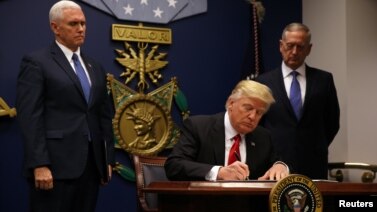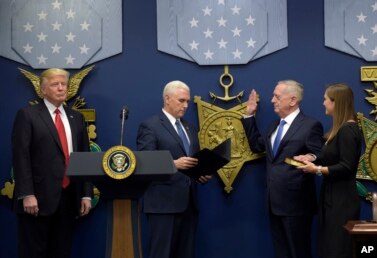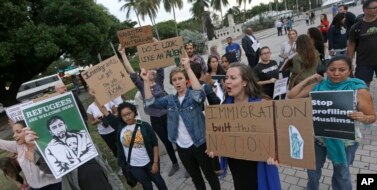Last Updated: Jan28

President Donald Trump signs an executive order he said would impose tighter vetting to prevent foreign terrorists from entering the United States at the Pentagon in Washington, Jan. 27, 2017.
Share
U.S. President Donald Trump has signed two executive actions designed to enhance U.S. security.
Trump signed the orders Friday at the Pentagon, where he participated in a swearing-in ceremony for Defense Secretary James Mattis.
While signing an executive memorandum, Trump said it was intended to better support the U.S. military.
"Believe me," the president said, "first I'm signing an executive action to begin a great rebuilding of the armed services of the United States, developing a plan for new planes, new ships, new resources, and new tools for our men and women in uniform. And I'm very proud to be doing that."

President Donald Trump, left, listens as Vice President Mike Pence, second from left, performs a ceremonial swearing-in for Defense Secretary James Mattis, second from right, at the Pentagon in Washington, Jan. 27, 2017.
The second, an executive order titled "Protection of the nation from foreign terrorist entry into the United States," was said to call for implementation of "new vetting measures" intended to bar so-called "radical Islamic terrorists" from entering the United States.
The White House did not immediately make the text of the decrees public, but draft versions of the documents were obtained by some U.S. news media earlier this week. The order on refugees is expected to suspend the entire U.S. refugee resettlement program for four months, while further rules for investigating or vetting would-be immigrants are established.
‘We don’t want them here’
The official text of the presidential order is expected to specifically bar Syrian refugees from entering the United States for an indefinite period — until the president decides they are no longer a threat.
No visas of any kind are expected to be issued during the next 30 days to travelers from certain Muslim-majority countries: Iran, Iraq, Libya, Somalia, Sudan, Syria and Yemen.
Reacting to the refugee order, more than 100 protesters on Friday formed a human chain at the entrance to a federal office building in New York City that houses the U.S. Department of Homeland Security, as well as the FBI and other federal offices, including VOA's New York bureau.
The president said Friday that only people who support the United States should be allowed into the country. The reported language of the executive order echoes Trump's campaign-trail promises to enforce "extreme vetting" for Muslims and people coming from countries with ties to terrorism.
Protester Emily Nostro prepares a sign for a rally against President Donald Trump's executive order on Muslim immigration in downtown Miami, Jan. 22, 2017.
"We don't want them here," Trump said. "We want to make sure that we are not admitting into our country the very threats our soldiers are fighting overseas. We only want to admit those into our country who will support our country and love deeply our people."
‘Heartbroken’
One of the protesters in New York, Debbie Altmontaser of the Muslim Community Network, told reporters, "The impact of this executive order will be immense, both on immigrants as well as Muslims. We fear that it will further marginalize communities."
Mark Hetfield of the Hebrew Immigrant Aid Society, added, "It's clear that President Trump has decided to pick on refugees. ... This is going to cost tens of thousands, hundreds of thousands of people their lives, because they won't find protection here. They won't find protection anywhere."
Former U.S. Secretary of State Madeleine Albright told reporters and members of the refugee resettlement committee that the action would "directly harm our security interests."

Protesters chant slogans against President Donald Trump's executive order on Muslim immigration in downtown Miami, Jan. 26, 2017.
Nobel Peace Prize winner Malala Yousafzai — a 19-year-old Pakistani student activist once attacked by the Taliban, but now recovered and living in the United Kingdom — said she is "heartbroken" that the U.S. "is closing the door on children, mothers and fathers fleeing violence and war."
Former New York City prosecutor Paul Callan said Friday that he expects the refugee order will generate a great deal of legal activity, particularly if people already in the United States are affected.
"You can block people from coming into the country, but once they're in, all persons have constitutional protections if they're in the United States,” he said. “And certainly, if there is a claim that those constitutional rights are being violated by an executive order, that claim would go to the U.S. Supreme Court."
Margaret Huang, executive director of Amnesty International USA, said Friday, "This puts anti-Muslim bigotry into policy and is eerily reminiscent of the kind of religious discrimination we've documented in counties like China and Iran."
She called the order "cruel" and "inhumane" and said it violates international law.
"Our refugee programs should not paint individuals' national origin or religion as suspicious or unwelcome," she said. "People seeking asylum are no different than anyone else who wants to live free from fear," she added.”




No comments:
Post a Comment